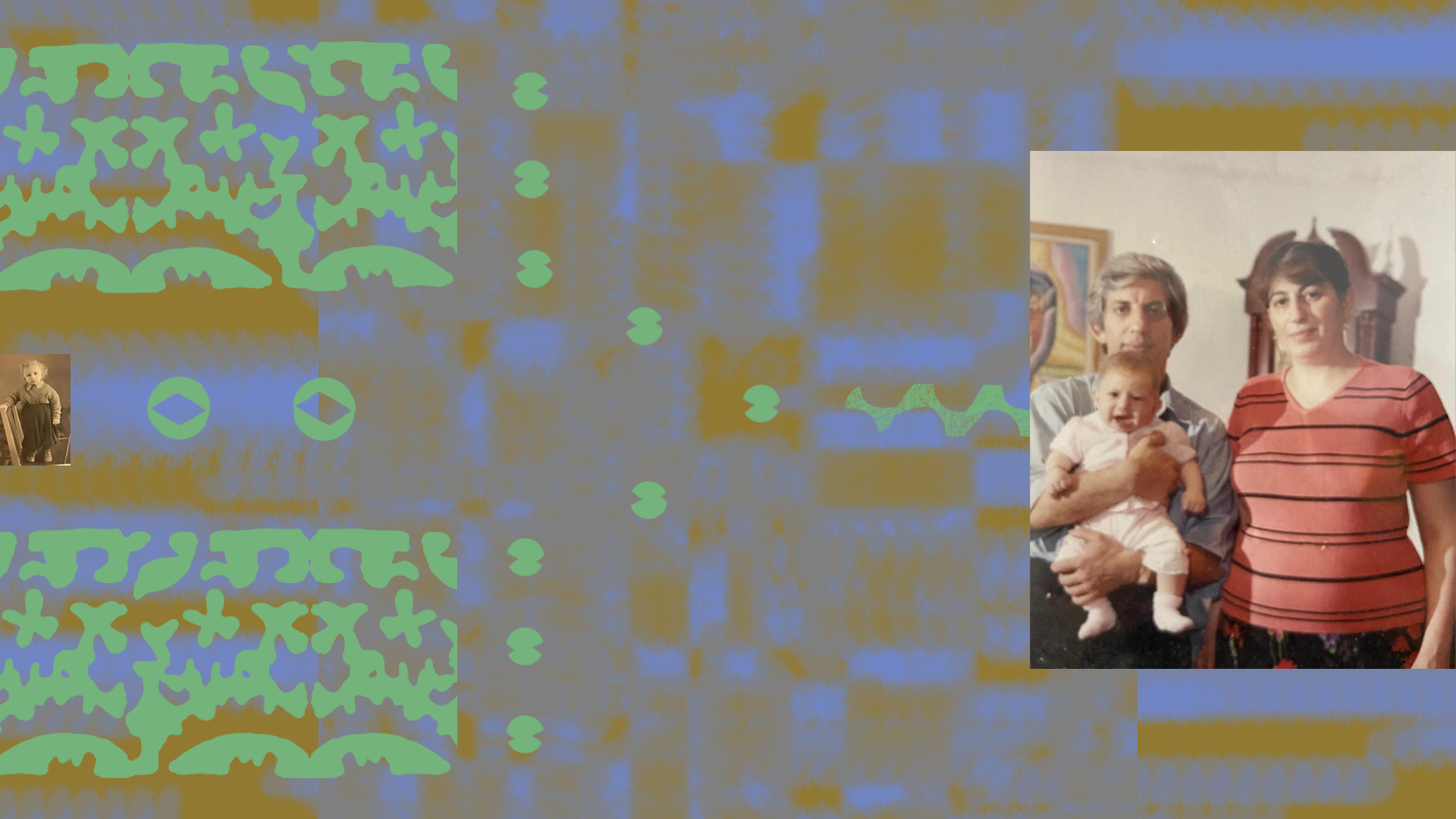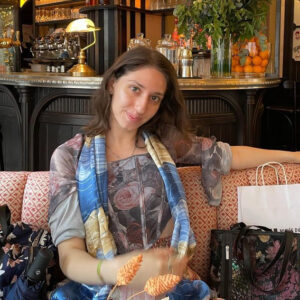This piece is featured in our New Beginnings series, exploring the emergent ideas, emotions, and social upheavals of a new era of progressive Jewish culture. We are writing for a brighter future, while honoring our past. More to come.
Going to graduate school was supposed to be exciting and liberating, but the Indiana-bound-New York train ride with my mother was filled with crying. The day before I left, my father had been diagnosed with Alzheimer’s, the same illness my grandfather died from twelve years before. I was so ready to leave New York and its loudness. I was so excited to finally start my life on my own, away from my family, with whom I had such a tense relationship. But this diagnosis had changed everything. Suddenly I couldn’t imagine living away from them. I couldn’t imagine being away from my father as his memory slowly began to slip away.
The night before I boarded the train had also been spent in tears. It was my last day interning at Lilith and my father, who had just come from that fateful doctor’s appointment, offered to pick me up. Anticipating the news for a few weeks, I asked him what he had learned. It was then that my father confirmed what he had been expecting for the past few years, from the moment he began noticing his sudden and rapid memory loss.
But now, it was all real. My father, who was always a stubborn, strong-willed man, was losing himself. He had always been terrified of losing control over elements in his life, both small and large. But now he was losing control over himself. It was frightening to see him swallow hard after telling me of his diagnosis – it was even more frightening when he told me how scared he was of ‘losing his mind.’
The car ride home was filled with silence, and as the wheels turned I felt flickers of regret for wanting to leave home. My father told me that he wanted me to have fun, to make meaningful memories and connections, and to work toward the one thing I had wanted to do since I was fifteen. Months later, well acclimated to my MFA program now, I haven’t actually been able to write about his diagnoses yet. This is the first time I’ve been able to put it down on paper.
When I left New York, it was humid and raining. It felt like my entire life was packed into four large suitcases. On the curb outside of Penn Station, my father pulled me into a hug. “I’m proud of you,” he told me. “Don’t worry about me, I’ll be fine.”
As the train pulled out of the station and through the ever-green suburbs, the mood was jovial; my mother and I recalled our childhood memories and bonded, which is exactly why we initially opted to take a seventeen hour train ride together. Just the two of us. It hasn’t been just the two of us for so long. And during that morning when time was warped and muddled, I was able to leave the present behind and remember what it felt like to be a little girl again, with my mother, talking as we used to.
Things got tense around dinner, when my mother was on the phone with her sister. She seemed so much happier than I was used to seeing her, like she had forgotten the burdens of this new reality we were both entering. After she hung up, I asked her if she told her sister about my father’s Alzheimer’s. “I wouldn’t know what to tell her,” she said to me, and the heaviness returned to her voice. I turned to the side, saw her reflection in the diner cart window, and looked back at her again. “Can I hold your hand?” I asked. She grabbed my hand from across the table.
“When I get home, I’m going to have to start looking into treatments with him,” she told me. My mother has always been the kind of woman who put her family’s needs above her own, probably as a product of her time, but this moment was especially shattering. She was en route to leaving her only daughter in a foreign state and would return home to her husband’s illness progressing. She was scared.
This new beginning was daunting for the both of us for so many reasons. I was worried about what my father would be like after the two years of my Master’s program were up; she was worried about what the rest of her life would look like. “He told me that he doesn’t want to become a burden on our family,” my mom said of my father. “He told me that if it ever gets bad, he wants me to put him in a nursing home. Well, I won’t. I’m going to spend my life caring for him.” Now sixty, my mother has been married to him since she was eighteen. They had basically grown up together.
I moved to sit down next to her, the yellow light in the diner cart so beautiful and dim, reflecting on our faces. By then, I couldn’t really help it. We cried together. She was still trying to keep it together for me.
That night I went to bed thinking about change and newness and how some moments can have dual feelings attached to them. The sky outside my window was foggy and brown, and I spent that night wondering how it would all change in the morning. How it would all change in a few months and years.
*
When I woke up, we were in Delta, Ohio. The emotions of the previous night sat heavy on my face, under my eyes. We walked to the diner cart again, ate some breakfast, talked very simply about nothing at all, and went back to our cabins. In a few hours, this trip would be over, and we would both face the reality of things changing. Soon, I’d settle into my apartment, she’d leave, return home, and begin a new kind of life while I’d do the same. The air between us was nervous.
A few hours after she helped me hang pictures and fluff pillows, my father called her on the phone.He told her that the doctor warned him that in two years, he’d have to stop driving. In four, he’d need someone to help him manage his money. My father was always such a brave man, but I could hear the fear in his voice. They thought I couldn’t hear anything. Tense as our relationship is, I love my father. Those first few days were excruciating as I grappled with what might become of him in the time I’d be away from home. Who would he become?
My mother left on my first day of orientation. I hugged her goodbye, knowing that in a few hours she’d be home again with my father, while I’d be left to deal with the unfolding of my life on my own. In a new place. In a new life. This new life hasn’t hit me yet, but I also know that the doctor’s words were mostly precautionary. My dad will probably be okay in two years. We can only be patient and do what we’re meant to be doing. Just as he told me before I left for Indiana.
*
Months later, I recently revisited New York for a week while Notre Dame had a mid-term break, and for the most part, I enjoyed it. But the truth is, I hate Brooklyn, and I was so preoccupied, that I don’t know if I really took advantage of seeing my father after his diagnosis.
On the ride back to the airport, however, it was just the two of us, and I was excited to spend these moments with him, spare as they were. He was angry behind the steering wheel, worried I’d miss my flight. I attempted the only kind of conversation I knew to have with him, which was always bending-boundaries because I felt if I didn’t probe deeper, then I didn’t have him at all.
I asked him if he loves my mother, which wasn’t the first time, but I somehow find that that answer changes depending on his mood and the comfort he feels around me when I ask. But he was angry at the traffic, and ultimately at me, for leaving home again and disrupting his sense of familiarity. So he told me to go fuck myself, and I retreated quietly into the passenger seat, making my body smaller while my hand stretched out of the window.
We sat quietly for a few moments, as we often do, because adulthood creates strangeness between parents and children, and I never had the proper tools to love him after 7. He started talking to me about a dream his nephew had about his illness, and I asked whom he told. Quite a few people, he suggested, but I think his way of keeping things under wraps is his way of controlling himself. I asked him if he’s ever cried about his diagnosis and he told me he had not, that it wouldn’t change anything, though he suggested that he’s thought of it many times. He told me he’d come to terms with it, with dying. And I asked, “dying?” And he said the doctor who originally gave him ten years but that another one gave him twenty.
Silence again for a few minutes, I could only process the emotions by silencing them. “You should really steer clear of watching the news because that anger will only make it worse for you.” He responded sarcastically, as I halfway accepted he would.
Out of nowhere he told me that “I hope I make it to your wedding, but you guys (referring to me and my boyfriend) are taking your time,” and I said “give us a few years, maybe three.” And he shot back with a, “yeah, and after that, you’ll find a problem with each other and break up.” I told him to stop being so pessimistic. Silence again, then the same-old routine of him telling me his stories that I’d heard so many times I could recite them back to him.
On the way out of the car (he had momentarily parked by the Terminal 8 entrance), he led me into a hug, and I started lightly crying. He’s shorter than I am now, and that realization made me sob. I didn’t want to let go of my shrinking Papa. And he laughed the kind of laugh he does when he’s actually quite emotional and on the verge of tears. He told me that if I keep crying, he’ll cry. I couldn’t stand it. I couldn’t handle it at all, all the pain sitting there, growing cells around itself like a black tumor.
I got to the airport with fresh tears and even fresher eyes, barely making it to the plane because of the massive TSA lines.
Right after boarding concluded, an older woman had a medical emergency and in the moment I felt no sympathy but annoyance as though it were somehow her fault, because I was worried about missing my connecting flight in Charlotte.
But she could have just as easily been my Papa, all frail, fragile, and old, because he’s determined to keep working and kick his illness in the face ( his line of work requires constant traveling). That could have been me on the verge of dying and someone like me could have felt annoyed by the disturbance. How painful that would be.
Maybe all the pressure was amalgamating into a dark and ugly feeling. I don’t know what he’ll be like when I return for Thanksgiving. It seems that every time I see him, I’m entering a new beginning of a new kind of painful and damning reality.

